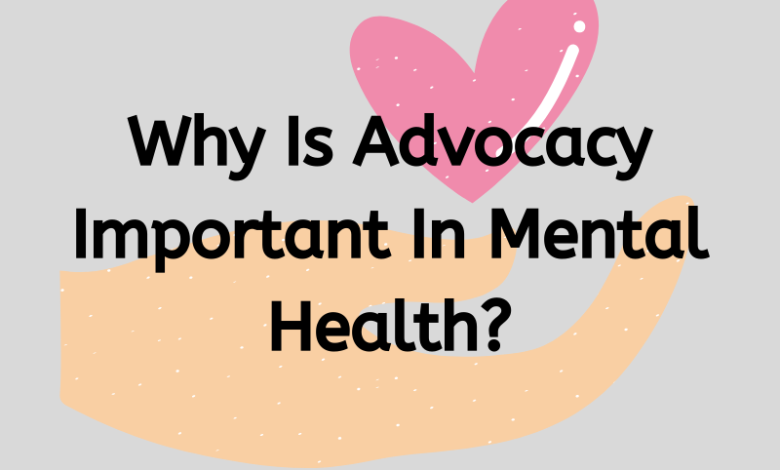Why Is Advocacy Important In Mental Health?

Why do we need advocacy in mental health? Advocacy is a word that has been around for over 100 years. It was defined by the Oxford English Dictionary (OED) as: “A person who pleads or argues on behalf of another, typically when being considered for a job or elected to office; now esp. as a political term: A person who pleads for, supports, or champions a cause”.
The word goes back to the 14th century and originates from the French word “avocats” meaning a legal representative in a court of justice.
When I first read this definition, I was reminded of my Mom who is always fighting on behalf of me and others in my family when they are in need. Unfortunately, due to her own mental illness, she is at times unable to fight for herself and I am now in a position to be my Mom’s “advocate”. In the past year, I have been learning more about mental health advocacy as an important part of recovery.
I wonder how many people who are currently struggling with their own mental illnesses know that they may one day be in a position to be an advocate for other people with mental illnesses.
Mental Health Advocacy – Simplified
In my work as a peer support worker, I have seen the importance of advocacy and how it can help people to access resources, feel heard, and begin their journey to recovery. Peer support workers are people who have experienced mental illness and/or addiction and are now working as a part of the mental health system. They provide support to other people struggling with mental illness or who are going through a mental health crisis.
I recently heard a definition for peer support that I think really nails it: “Peer support is about helping each other during difficult times”. This has been my experience as a peer support worker and as someone who has received peer support. I have also been on the other side of things, as someone who has received support from my peers. It is an incredibly powerful experience to know that there is someone else out there who understands what you are going through and can offer encouragement and hope.
Ways to Choose the Best Advocate for Your Mental Health
The first choice to make is whether you want support from a family member or friend, or if you would prefer an outside professional.
I personally find it easier to open up to a family member or close friend about my mental health issues than I do with an outside professional such as a doctor, psychiatrist, counselor, social worker, etc. This is not to say that I don’t trust professionals, but it can be difficult to find the right one and to build a relationship of trust.
If you do decide to go with a family member or friend as your advocate, there are a few things you need to keep in mind, make sure:
– that the person is someone who has demonstrated that they are trustworthy and will keep your information confidential.
– the person is supportive of your journey towards recovery, including any decisions you make about seeking treatment.
– that the relationship is not too close (i.e., first degree family members). This can cause problems when it comes to confidentiality and objectivity.
If you decide to go with an outside professional, there are a few things to keep in mind, make sure:
– that the professional has experience working with people who have mental illness.
– that the professional is licensed and insured.
– that you feel comfortable with the professional and that you have a good rapport.
– that you ask the professional about their approach to advocacy and whether they will be supportive of your decisions.
– that the professional is available to you when you need them.
Types of Advocates
There are many different types of advocates who can support you on your journey to recovery. It is important to find the right one for you and your individual needs.
Medical Advocates
These advocates come from the medical community such as doctors, nurses, emergency room workers, etc. When I am in crisis and need to see a doctor for medication or other types of treatment (e.g., ECT), it can be really helpful to have someone with me who is familiar with my mental health history. And knows what questions to ask. These advocates can also help you to advocate for yourself while you are there, such as asking the doctor or nurse specific questions about treatment and making sure that they give you all of the information necessary (e.g., side effects).
2. Mental Health Professionals
Mental health advocacy professionals can provide a number of services such as counseling, therapy, case management, and social work. These advocates can be really helpful in helping you to access resources and treatment. Also in providing support along the way. It is important to find a professional who you feel comfortable with and who supports your decisions.
3. Peer Support Workers
Peer support workers come from the mental health community. I have been a peer support worker for many years. My role is to provide emotional support, help people access resources and treatment, and build community. Having a peer advocate can be very beneficial. They understand what you are going through and can offer encouragement and hope.
4. Friends and Family
Family and friends can be a great source of support. But it is important to choose someone who is supportive and will keep your information confidential.
They can help you to access resources, provide emotional support, and offer practical assistance.
5. Self-Advocacy
Self-advocacy means that you are your own best advocate. This can be a challenging but rewarding journey. It is important to learn about your illness, understand your rights, and know what resources are available to you. You can find information and support through peer support groups, advocacy organizations, and the internet.
Conclusion
This guide provides you with complete understanding of what is meant by a mental health advocate. An advocate can be of great help to you during difficult times in your life.





